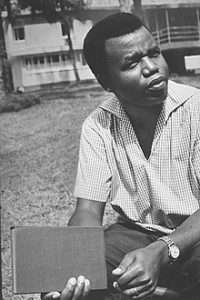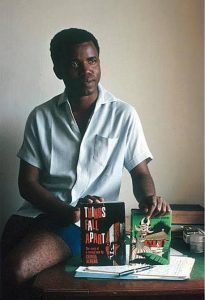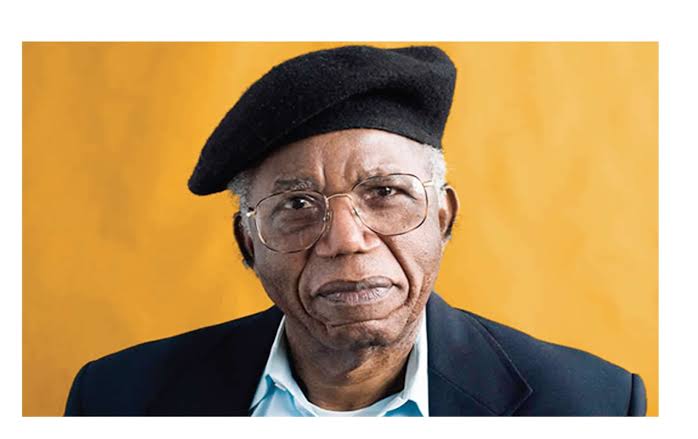Described as the founding father of African fiction whose novels chronicled Nigeria’s troubled history, Chinua Achebe was born in the traditional Igbo village of Ogidi, eastern Nigeria, on the 16th of November, 1930. He was christened Albert Chinualumogu Achebe by his Christian convert parents. A Nigerian writer, poet and critic, Achebe’s first novel Things Fall Apart(1958) occupies a pivotal place in the history of African literature and remains the most widely studied, translated and read African novel. Along with Things Fall Apart, his No Longer at Ease (1960) and Arrow of God (1964) complete the so called “African Trilogy” His later novels include A Man of the People (1966) and Anthills of the Savannah (1987).

Achebe attended a local missionary school where the children were discouraged from speaking the Igbo language, and were asked to out away actions and traditions that the missionaries deemed “pagan.” At age 14, Achebe was sent to the prestigious colonial Government College, Umuahia. His schoolmates included the poet Christopher Okigbo, who became a very close friend. In 1948, he won a scholarship to study medicine at what would become the University of Ibadan. However, after his first year, he realised it was writing that most appealed to him. He switched to a degree in English literature, religious studies and history.
At the university, the English curriculum closely followed that of the British, but the teachers did not fail to introduce works that they felt would be relevant to their African students. Works such as Joseph Conrad’s Heart of Darkness and Joyce Cary’s African novels. While they were great works of literature, no doubt, Achebe felt they were not up to times with the growing anti-colonialist mindset sparking in the West Africa after the second world war.
By the time he graduated in 1952, Achebe had decided to be a writer telling the story of Africans and the colonial encounter from an African point of view. Drawing some motivation from Cary’s famous novel, Mister Johnson, which was set in Nigeria, and had received much accolades from English critics, Achebe decided to tell the story of Africa from the African perspective. Cary’s novel, to Achebe, seemed to be “a most superficial picture of Nigeria and the Nigerian character”. And then he thought: “If this was famous, then someone ought to try and look at this from the inside.”

According to the Guardian, the publication of Achebe’s first novel titled Things Fall Apart in 1958 “not only contested European narratives about Africans but also challenged traditional assumptions about the form and function of the novel. His creation of a hybrid that combined oral and literary modes, and his refashioning of the English language to convey Igbo voices and concepts, established a model and an inspiration for other novelists throughout the African continent.” Chinua Achebe was the founding editor of the influential Heinemann African writers series, and he oversaw the publication of more than one hundred texts that pushed good writing by Africans around the world, and in affordable editions.
Chinua Achebe passed at the age of 82 on the 21st of March, 2013 in the United States.
The world of literature and the entire world at large felt at a loss. Several doctors of letters, heads of states, literary enthusiasts, artists, and students poured out letters in mourning for the legendary writer. One of such writers was the late Toni Morrison, who stated the impact that Achebe had on her own beginnings as a writer. She wrote: “My debt to Achebe is the best kind. Large, minus repayment schedule and interest-free.”
Nigerian President Goodluck Jonathan said Achebe’s admirers had all learnt “indelible lessons of human existence” from his works. In his statement, “Achebe’s frank, truthful and fearless interventions in national affairs will be greatly missed at home in Nigeria because while others may have disagreed with his views, most Nigerians never doubted his immense patriotism and sincere commitment to the building of a greater, more united and prosperous nation that all Africans and the entire black race could be proud of,” the president said in a statement.

Simon Winder, publishing director at Penguin, called him an “utterly remarkable man”. He said, “Chinua Achebe is the greatest of African writers and we are all desolate to hear of his death.”
A host of many others joined the bandwagon to wish the courageous writer whose pen never faltered a smooth transition to the life-after, as well as comfort to his bereaved family.
Of such sympathisers included students who had read Achebe’s Things Fall Apart during school days, and recounted how it was both a magnificent and transforming book.
In his lifetime, Achebe received numerous awards and more than 30 honorary doctorates.
About Chinua Achebe, Nelson Mandela wrote: “There was a writer named Chinua Achebe, in whose company the prison walls fell down.” This, perhaps, was one of the writer’s most cherished tribute and praise.
For Mandela, the greatness of Chinua Achebe, founding father of the modern African novel in English, lies in his having “brought Africa to the world” while remaining rooted as an African. As the Nigerian Achebe used his pen to free the continent from its past, said the former South African president, “both of us, in our differing circumstances within the context of white domination of our continent, became freedom fighters.”
We remember Chinua Achebe. We remember the giant of African literature. A true hero, teacher, and beacon of never waning light.






